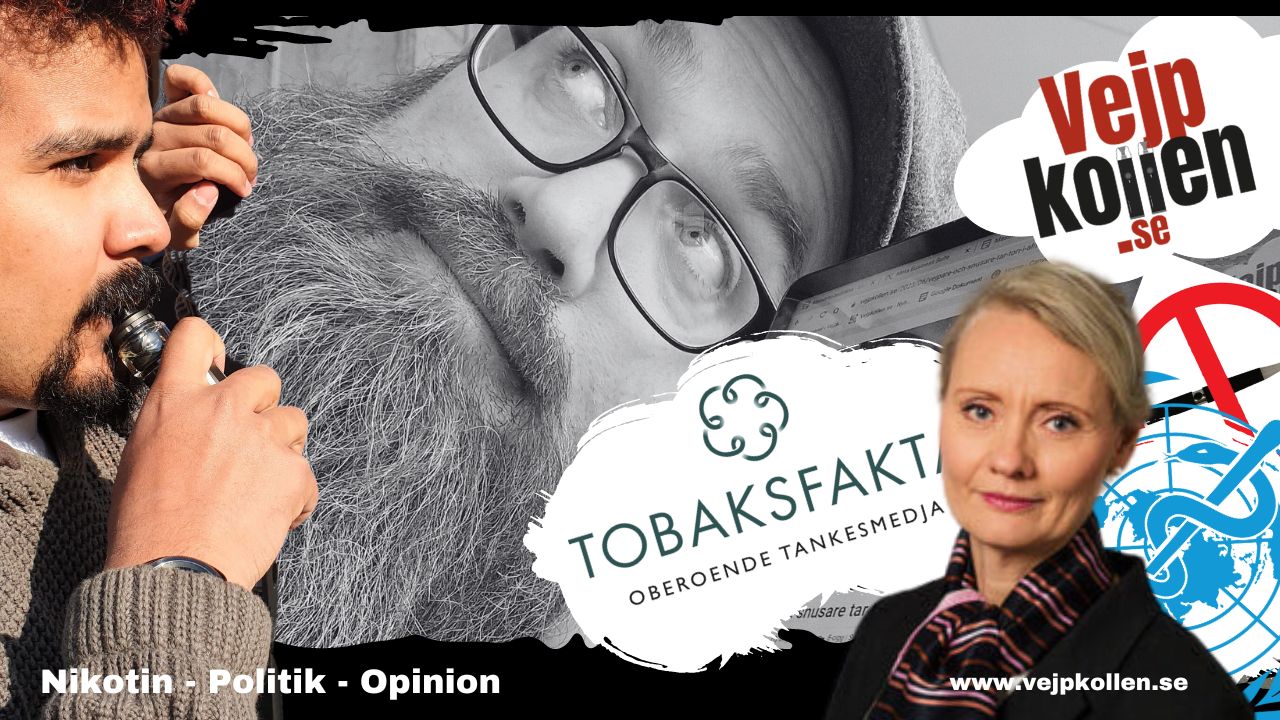More bans, confusing research, incurable drug fears and a deadly message to smokers. Tobaksfakta's first newsletter of the season adds nothing new. But what does it matter? Scary headlines are to be expected.
This is an opinion piece. Do you think differently? Please comment below.
Summer is over.
No, it's not the weather, or the start of the school year, or traffic jams and congestion on the way to work.It's about the news flow. Now the staff of the lobbying organisations have started their campaigns. A few weeks before the Parliament opens, the headlines are starting to pile up in the emails.
The most obvious example of this is the first newsletter of the season from the think tank Tobacco Facts.
Tax-funded organisation
Tobaksfakta is a lobbying organisation funded by the Swedish Public Health Agency. Its mission is to influence legislation and frameworks concerning nicotine, which in turn governs the activities of the said authority and ultimately determines how much money should be spent on "tobacco prevention", i.e. on Tobaksfakta's activities. Fantastic arrangement. Tobacco facts, along with the team of professional and interest groups which controls the activity, 6 million each year by the Public Health Agency, directly, without any political intermediaries, to do the job.
Apart from the fact that it involves taxpayers' money, it is also journalists should prick up their ears; this is close to what many would call propaganda. Nonetheless, it is part of the debate around nicotine and smoking, and the news value lies in the underlying message rather than the direct content of the articles.
Pregnant mice that vejpar
Tobaksfakta's first newsletter of the season is, not surprisingly, a delight for anyone who genuinely dislikes developments in the nicotine market. The message is that e-cigarettes, snus and nicotine pouches are dangerous and completely unnecessary products that serve no practical purpose whatsoever.
It starts off strong, with an article about aa study that suggests that e-cigarette use during pregnancy negatively affects foetal development.
Interesting? Of course it is. It sounds worrying, as most people know that quitting smoking is difficult and that many people actually use nicotine to help them do it. This of course also applies to pregnant women. But is the study worth writing about?
Well, yes.
It turns out that the study was done on mice.
Mouse studies are very unreliable in determining the risks to humans. They can, and should, at most, give an indication of what we should do more research on. The hypothesis is whether e-cigarettes affect the unborn child and whether this puts the child's health at risk. This information is very important at a time when many people are using e-cigarettes (or snus) to stay smoke-free.
The risks are not even measurable
In this case, the hypothesis has actually been tested more than once. And it has been done via randomised control trials in humans. Two independent studies concluded that when e-cigarettes are used to stop smoking during pregnancy, the development of the foetus does not differ from that of non-smokers (unlike smoking, where the risk of damage is imminent). However, nicotine vaping is very effective in keeping the pregnant woman smoke-free, far more effective than nicotine medicines.
Smoking is very harmful to child development. The researchers therefore conclude that the combination of effectiveness in smoking cessation and low risk to the child means that the benefits far outweigh any risks. Vejpkollen wrote about such a study just one week ago. Further a study on this was published a few years ago.
The danger lies in the message
The somewhat nasty comment is that the only thing we learn from that study in the Tobacco Facts newsletter is that mice should not vejpa when they are pregnant. And that smokers should consider both nicotine medicines or e-cigarettes if nothing else works to stay smoke-free.
But it is far from certain that journalists will be critical of this type of research, and the lobbyists at Tobacco Facts know this. "My guess is that other media outlets will jump on this study like hungry perches. We won't see any nuances. Why would Tobacco Facts highlight something that goes against their agenda?
The question is what message Tobaksfakta really wants to send to pregnant smokers? Or to those who barely stay smoke-free with the help of snus, e-cigarettes or nicotine pouches during pregnancy? The risk of them falling back to smoking is indeed imminent. But the user perspective is completely missing in Tobaksfakta's fierce warfare against non-medicated nicotine.
"Unnecessary products" and bans
Much of the news flow about nicotine in Sweden has for some time been directly linked to Tobaksfakta. They provide not only "news" but also suitable interviewees to the media. It is very often the same people who make statements in articles on the subject around the country. It is all too often doctors and officials, close to the organisation, who act as 'experts' when needed. They are strikingly often saying exactly the same things about what "problems" exist with nicotine today and what actions should be taken.
Tobacco Facts' solution to the nicotine issue? Prohibition and stricter regulation. All nicotine should be removed, or at least medicalised (via nicotine medicines and treatment). This is also made clear in the newsletter.
With a snazzy promotional image on the public health authority's Secretary General Karin Tegmark Wisell, Tobaksfakta proposes that everyone nicotine products (other than medicines) should be treated as cigarettes. - with taxes, flavour bans and the whole thing. These are "unnecessary products" that are also dangerous for babies. For smokers who want to stop smoking, there are already proven medicines available.
Now, this is not exactly news. Vejpkollen has reported on the Public Health Agency's position on the nicotine issue on several occasions. But it is striking how stubbornly organisations like Tobaksfakta continue to push the issue - especially since it is not about smoking anymore but about all nicotine. It seems even more strange when Swedish politicians have already taken a clear position in the other direction: they want to see harm minimisation instead of more restrictions. A majority in Parliament wants products such as snus and e-cigarettes to reduce the harm of nicotine consumption - as a substitute for cigarettes and smoking.
Maybe someone should react to the fact that Tobaksfakta actually spends millions of taxpayers' money to counteract this development?
Studies 10 years old
Finally, Tobaksfakta allows a chronicling doctor to tell the reader that snus certainly doesn't work for smoking cessation. She bases her analysis on a Norwegian study, where statistical data showed that snus use (mostly among women - who made up over 70 per cent of the test group) was not associated with smoking cessation. Oh dear, says the news nose. Worth an article?
Well, yes.
It turns out that the study is based on statistical data from 2010 - 2012. i.e. information that is more than ten years old. Somewhere along the line, the novelty wears off.
The doctor has (consciously or unconsciously) chosen not to note that a lot has actually happened in the nicotine market in Norway (and the rest of the world) since 2010. For example, new raspberry-flavoured nicotine pouches have been established on the market, these products have become very popular, and smoking in Norway has decreased drastically over the past five years, especially among young women who use snus?
The study is fundamentally so irrelevant that it should make any decent thinking doctor frown.
It will be interesting to see if any journalist bother, or take the time, to scrutinise the actual content of the study, beyond the inflammatory press release?
Snus and lobbying
Talking about snus in Norway.
Vejpkollen, and indeed several Norwegian media outlets, have in recent years reported on several studies showing that snus is the most successful method for quitting smoking in the country. This is in competition with the cold turkey method (which most smokers try, at least once in their lives - sometimes several times...). From the Norwegian authorities, there are few there is no doubt that the development of new nicotine products in recent years is affecting the use of cigarettes. Smoking has declined as snus use has increased, particularly among young people, but also among Norwegian adults.
You can think what you like about this. But it can be reported on without falling into a black and white pattern, where the use of nicotine is all about profit for tobacco companies and children attracted by sweet flavours. It would be nice if more media took the time to scratch the surface and look at the reality underneath.
What is the purpose?
Tobacco Facts is an umbrella organisation. Under its umbrella are doctors, psychologists, nurses, teachers and anti-tobacco gnomes, as well as other professional associations. They all have a common agenda: to reduce the availability of nicotine and work, more or less consciously, to bring this market under the Pharmaceutical Law. Banning the products that smokers insist on using. like more than nicotine gum, sprays, tablets and patches. are means to an end. Are pharmaceutical companies sponsoring Tobacco Facts and their bidding partners? Probably. But it is difficult to track donations or to measure the value of conferences, career opportunities and networks with influential business contacts. What is true is that Tobacco Facts' message is in line with strong business interests. It should perhaps be more widely recognised.
Business as usual
Smoking takes lives every day. If smokers, or would-be smokers, can learn to use less dangerous ways to use nicotine, it can save lives. But the message from Tobacco Facts is clear:
"It doesn't matter how you use nicotine. Nicotine is also dangerous and you are just trading one dangerous addiction for another. You don't want that, do you?" This is an argument that has trickled down through doctors and health professionals to smokers. It has become a mantra, frequently in comment fields on Facebook, both under Vejpkollen's posts and in stop smoking groups. It comes strikingly often from smokers, who for various reasons are unable to quit smoking. Harm minimisation (e-cigs, snus, nicotine pouches) is not high on the agenda. Ignorance is rife. I can only conclude that this attitude has not spread by itself. Mn the good memory of Tobacco Facts, it's "business as usual" in the death factory.
An autumn full of control
Tobaksfakta's first news review is the start of an eventful autumn. Not only in Sweden. The WHO is holding a major meeting in November (COP10) to develop the future tobacco convention - a global agreement that will affect legislation worldwide. This is the tenth such meeting since 2004. User associations and company representatives are barred from the meeting, but organisations like Tobacco Facts are welcomed with open arms. Who else will be there representing Sweden? Probably people from the same department at the Public Health Agency of Sweden that happily funds Tobacco Facts. Many people fear that the WHO will be tougher on both e-cigs and nicotine pouches than it is on smoking tobacco and medicines in future convention texts.
Furthermore, it plans to EU comprehensive regulation of nicotine pouches - something that does not bode well for either prices or flavours. Here, too, the influence of Sweden's most governmental lobbying organisation is strong. But who cares about that?
Vejpkollen will of course keep an eye on COP10, the EU and Tobacco Facts - as usual from a user perspective - and always with a critical eye.
Happy autumn!
Stefan Mathisson
Editor-in-chief and publisher
Roadkollen.se




